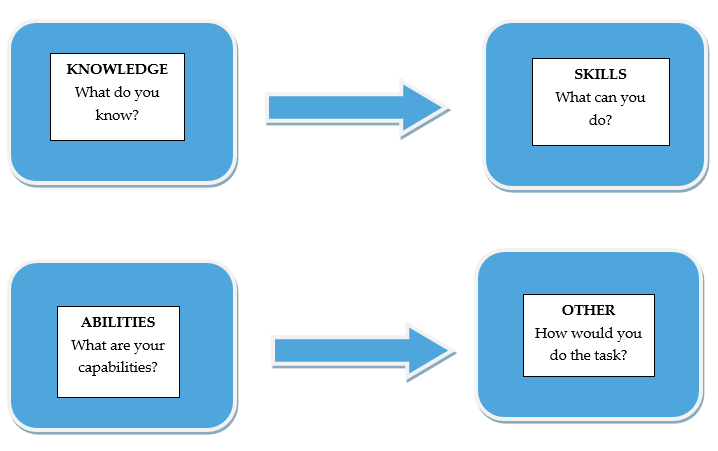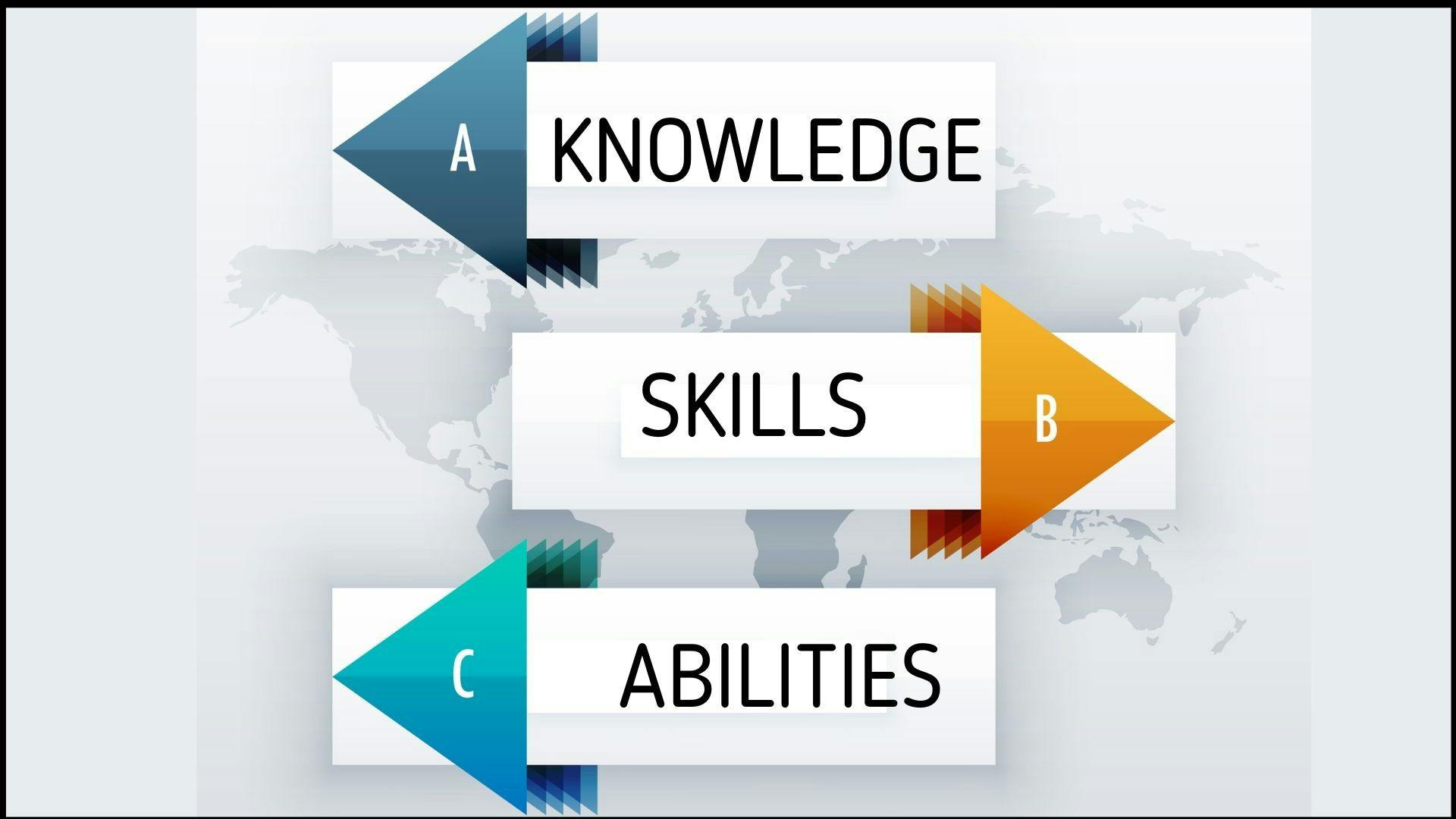KSAOs is a common abbreviation in human capital that stands for Knowledge, Skills, Abilities, and other characteristics. KSAOs are attributes of an applicant or an employee that are used for personnel selection, performance appraisal, and career development. Each job and company requires its people to have KSAOs relevant to the functions of the organization and position. Big organizations perform a job analysis to identify the KSAOs they need their people to perform efficiently in a job. This process usually involves engaging HR consultants and other relevant subject matter experts. This essay will take an in-depth analysis of KSAOs and give examples of these KSAOs.
Protip: Get A Professionally Done Resume That Beats The ATS and Attracts Recruiters' Attention, By Resumeble. Resumeble Can Also Help You With LinkedIn Profile Writing, CV Writing, Cover Letter and Others Services That Can Help You Land Your Next Job

Related: What are the methods of Job Analysis
Knowledge
Knowledge refers to the body of factual or procedural information that can be applied, such as knowledge of foreign languages or computer programming languages. Knowledge is information or expertise that is generally acquired through education and technical training. For an individual to have knowledge in a particular field, such as the field of engineering or auditing, they require some form of higher education such as a Bachelors degree or a Diploma. The depth of knowledge about a particular field is depended on the level of education and technical training that an individual acquires, with the highest level of education and training being a doctorate. An individual who holds a doctorate will have advanced knowledge about a particular subject area. The level of knowledge that is required for an individual job title and position differs from the demands and requirements of the position. Some roles, such as the role of a lecturer in a higher education institution, will require an individual to have the highest level of training; hence a doctorate would be the most appropriate. On the other hand, an individual who has a graduate trainee position will need a bachelors degree as a bare minimum. Applying for a graduate trainee position with a Ph.D. will only make employers doubt you as you will be overqualified for such a position. Employee training help in improving subject knowledge.
Advertisment
Skills
Skills are the capabilities required to perform tasks accurately, such as psychomotor activities like typing speed or driving ability. Skills can also be described as the expertise or talent needed to do a job or task. Skills are put into two different categories, and these are soft skills and hard skills. Hard skills are skills that can either be trained or developed. They can also be described as technical skills. Examples of hard skills include the skill to drive. If a company requires a driver, the suitable candidate should have a valid driver's license and a class relevant to the vehicle that the candidate will be operating. The skill to drive does not come naturally, it is a skill that has to be trained. With experience, that skill to drive will also become advanced.
On the other hand, soft skills include critical thinking, problem-solving, research, leadership, etc. Also referred to as core skills, these skills can come naturally to an individual, and they can also be trained and developed. Core skills can be developed through basic education and technical training. It inculcates lifelong learning abilities, which are critical in this turbulent environment. Employees with strong core skills easily adjust to technological and organizational changes.
Chances are you've heard the statement that Obama is a natural-born leader. Such inborn abilities come naturally and they can also be trained and developed. Leadership is often sharpened by actively being involved in leadership positions, as a result, you learn through experience. The more leadership positions one holds, the more they are skilled with leadership qualities. Skills are a reflection of whether the candidate or employee will be able to carry out their tasks. A lack of essential skills for a particular role will be evident in the quality of work done by that individual. When compared to a person with the relevant skills for that position, that person will significantly underperform the latter.
Related: Why you should keep upskilling?
Abilities
Abilities are more stable characteristics that can include cognitive, sensory, and physical abilities, such as empathy. Abilities have less to do with training and development as they mainly come naturally to an individual. The Oxford dictionary describes an ability as a talent or special skill. When employers assess whether a candidate is fit for a position or not, they will look at the candidate's abilities to perform the different tasks relevant to the organization's functions. Suppose a hotel is looking to hire an entertainer who sings in the hotel lobby, the hotel will have to look for an individual who has the singing ability. No matter how much you try to train a person who sings like a frog, that individual will never be able to have an angelic voice. Whilst abilities can be improved by continuous practice and coaching, they cannot be taught hence why they are sometimes referred to as special skills.
Other Characteristics
Other characteristics are traits that do not fit into the other categories, including values, work style, personality, and degrees and certifications. These other characteristics like Knowledge, Skills, and Abilities should be relevant to the position of the incumbent. One of the key things that employers look at when they assess other characteristics is assessing the personality of the individual. Whilst a person may have all the knowledge, skills, and abilities, their personality will impact their position and how they execute their responsibilities. Take, for example, a person who applies for a post to be a kindergarten teacher. That person may have a master's in early childhood development and teaching skills, as well as years of experience in similar roles. However, suppose that person, after being assessed usually by psychometrics testing and their personality exhibits low levels of tolerance and patience. Regardless of their teaching skills, an employer will begin to doubt their suitability for this position even though on paper they look good. The reason why the employer might think twice about such a candidate is that dealing with infants requires the highest level of tolerance and patience. If such a candidate is given the post, chances are there will be many complaints from parents because of how that candidate handles the children.
Another characteristic that employers look at when they are assessing a candidate for a position is the values of that individual. A person's values play an essential role in how they conduct themselves and approach their work. Values are described as the collective conceptions of what is considered good, desirable, and proper or bad, undesirable, and improper in a culture. Values can range from religious values to sexual values, and so on. A good example would be the highly controversial topic of homosexuality, especially in the Zimbabwean context. It is no secret that there is extreme prejudice against people from the LGBTQ society in Zimbabwe. It is against the law of Zimbabwe to be part of the LQBTQ society. Let's say an organization in the country is looking for an individual with specific skills that cannot be found locally, the organization will have to expand the pool of candidates to include people from other countries. If an individual applies for the position and states that they are part of the LGBTQ society, best be assured that they will be passed over even if they are the most highly qualified. This example speaks to how the candidate's values and the organization's values are completely opposed. Values are essential as they play a significant part in any job. An individual must look for an organization that aligns with their values. Being in an organization aligned with your values will improve job satisfaction, which will also have a positive impact on your work. On the other hand, an organization that does not respect your values will most certainly frustrate you to the extent that you will not deliver to the best of your ability.
Conclusively KSAOs are the elements that are used to assess an individual. The assessment is not limited to recruitment but can also be used in performance appraisal and career development. KSAOs allow employers to understand where the candidate lacks and where they can be assisted to ensure that they carry out their tasks in the best way. This identification of skill gaps is essential for the organization in terms of strategizing on upskilling and reskilling. Suppose an employer realizes that their employee has a shallow understanding of their job. In that case, the employer can recommend that the employee take up certifications to cover the skill gaps instead of terminating them. It is therefore clear that KSAOs play a fundamental role in human capital.
